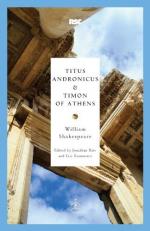|
This section contains 3,651 words (approx. 13 pages at 300 words per page) |

|
SOURCE: Fischer, Sandra K. “‘Cut My Heart in Sums’: Shakespeare's Economics and Timon of Athens.” In Money: Lure, Lore, and Literature, edited by John Louis DiGaetani, pp. 187-95. Westport, Conn.: Greenwood Press, 1994.
In the following essay, Fischer examines Timon's character in light of his “economic faults.” Fischer finds Timon to be an unsatisfying hero whose failure lies in his inability to receive.
G. Wilson Knight asserts that “in studying, normally, everything but economics, great poetry necessarily studies, though indirectly, economics too” (224). In Econolingua, I have chronicled how the works of Shakespeare reveal a habit of mind that links love and money in an intricate metaphorical system. For the bard, parallel spheres exist in relation to natural processes and artificial financial connections.1 The two worlds share a common lexicon, each with its own type of bonds, debts, dues, accounts, estimates, increase, profit, thrift, value, and use. The plays often...
|
This section contains 3,651 words (approx. 13 pages at 300 words per page) |

|


